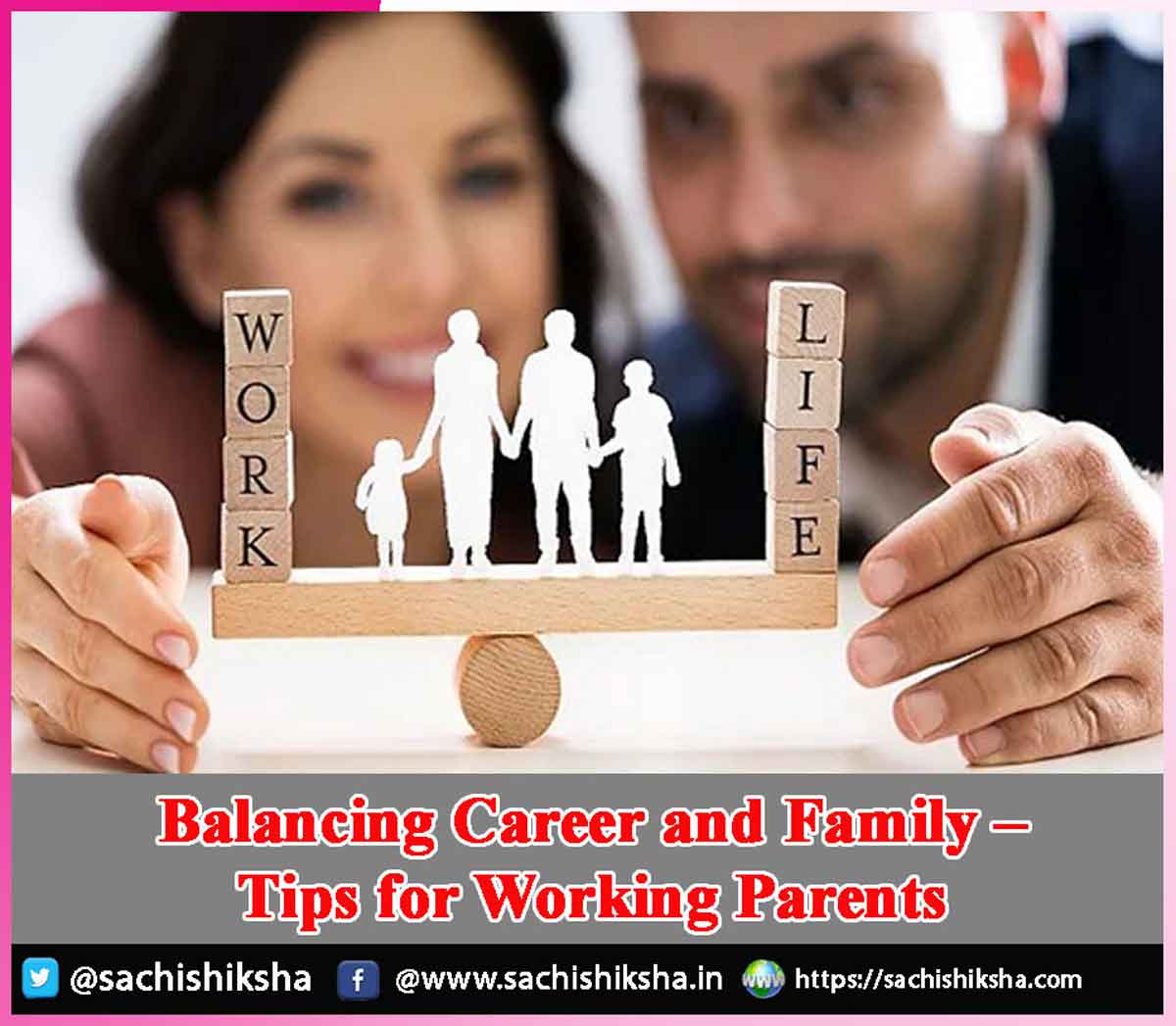Balancing Career and Family – Tips for Working Parents
Introduction: In today’s fast-paced world, one of the most persistent challenges, professionals face, is striking a balance between career ambitions and family responsibilities. As roles evolve in the workplace and at home, the pressure to perform excellently in both spheres can lead to stress, burnout, and fractured relationships.

The age-old tug-of-war between personal and professional commitments has intensified in recent years. The barrier among home and the workplace has become more reduced due to using cell Phones and working from home. Balancing career and family has thus become not just a time management issue, but also an emotional and social endeavor.
Table of Contents
The Modern Working Parent
The landscape of parenthood has drastically changed over the last few decades. With more women entering and staying in the workforce, the traditional roles of mothers as caregivers and fathers as breadwinners have shifted significantly. Today, it is not uncommon to see both parents working full-time while juggling the responsibilities of raising children, managing households, and striving for work-life harmony.
Dual-Income Households
According to the U.S. Bureau of Labor Statistics, over 60% of families with children have both parents employed. This economic reality is driven not just by necessity, but also by personal fulfillment, career ambition, and a desire to provide better opportunities for their children. However, this shift places additional demands on parents to carefully manage their time, energy, and attention across personal and professional domains.
Key Challenges Working Parents Face
Balancing a career and raising a family is never an easy task. Parents must often make sacrifices, set boundaries, and continually adapt to changing circumstances. Below are some of the most pressing challenges working parents encounter:
Time is perhaps the most valuable and limited resource for working parents. Between meetings, school pickups, extracurricular activities, and bedtime routines, managing time becomes a daily logistical puzzle.
- Guilt and Emotional Stress
Many working parents experience guilt—either for not spending enough time with their children or for not being fully available at work. This psychological game can cause tension, nervousness, and fatigue.
- Limited Flexibility
Although there are changes in working conditions, numerous parents are still missing the freedom of choice they require. Inflexible work hours, limited remote work options, and lack of parental leave can hinder a parent’s ability to effectively manage family responsibilities.
- Financial Pressure
Raising children is expensive, and many parents work longer hours or take on additional jobs to meet financial demands. This can compromise time spent with family and contribute to physical and mental fatigue.
Strategies for Achieving Work-Family Balance
Despite the challenges, countless families find creative, resilient ways to make it work. Here are some of the most effective strategies working parents employ to balance their dual roles:
- Open Communication
Clear and open communication between partners is essential. Sharing expectations, responsibilities, and emotional burdens can reduce resentment and build a strong support system within the family.
Tip: Weekly check-ins can help partners stay aligned on schedules, upcoming events, and household needs.
- Flexible Work Arrangements
Many employers now offer flexible work hours, remote work options, and job-sharing arrangements. Parents who advocate for and utilize these options often find more balance.
Example: A parent might choose to start work early and finish by 3 p.m. being home for after-school activities.
- Prioritizing Tasks
Not every task is of equal importance. Learning to prioritize and sometimes say no to additional responsibilities at work or in social circles can free up time and mental bandwidth.
Strategy: Make use of tools such as the Eisenhower Matrix to tell the difference between important and crucial jobs.
- Building a Support Network
No parent can do it all alone. Leaning on extended family, friends, neighbors, and trusted childcare providers can provide much-needed relief.
Tip: Consider joining a local parent group or childcare co-op for shared responsibilities and support.
- Quality over Quantity
Being present and engaged during the time spent with family often matters more than the number of hours. Simple rituals—like reading bedtime stories, family dinners, or weekend outings—create lasting bonds.
- Self-Care and Mental Health
Maintaining one’s psychological and physical health is essential. Parents who invest in their health—through exercise, therapy, hobbies, or rest—are better equipped to meet the demands of parenting and work.
The Role of Employers in Supporting Working Parents
Employers are significant factors in assisting parents attain equilibrium in their parenting. Organizations that recognize and support the needs of working families benefit from increased employee satisfaction, retention, and productivity.
-
Parental Leave Policies
Offering generous maternity, paternity, and adoption leave helps, parents bond with their new children and transition smoothly back to work.
-
On-Site Childcare or Subsidies
Some companies offer on-site childcare facilities or subsidies for daycare expenses, which significantly ease logistical challenges for parents.
-
Flexible Scheduling
Employers who allow for flex hours or remote work empower parents to tailor their schedules around family needs, improving work-life integration.
-
The Changing Face of Parenthood
As society continues to evolve, so do the expectations and possibilities for working parents.
Emerging Trends
- Co-Parenting Models: Divorced or separated parents work collaboratively to manage shared responsibilities.
- Shared Parental Leave: Policies that allow both parents to split time off after childbirth.
- Men Taking Active Roles: More fathers now take paternity leave and assume equal parenting duties.
Cultural Shifts
There is a growing cultural awareness around the importance of work-life balance and mental health. Parents today are more vocal about their needs and more willing to challenge outdated norms that no longer serve them.
- Open Conversations with Your Partner
One of the most important aspects of preparing for parenthood is maintaining strong, transparent communication with your partner.
- Build a Financial Safety Net
Preparing financially is one of the smartest ways to ease the transition into parenthood. Child-rearing can be expensive, and having a solid financial plan allows for more peace of mind.
Financial planning tips:
Create or expand a backup fund (aiming for a minimum of three months to cover living expenditures).
Understand your health insurance and maternity/paternity leave benefits.
- Prioritize Health and Wellness
A healthy move into parenthood requires both mental and physical wellness. The stress of balancing personal goals with family planning can take a toll, so it’s essential to invest in your well-being.
- For Aspiring Mothers: Ensure regular checkups and prenatal vitamins if trying to conceive. Medical advice should be sought early so as to deal with any reproductive concerns.
- For Both Partners: Exercise regularly and maintain a nutritious diet.
Practice stress-reducing activities like yoga, meditation, or journaling. Don’t underestimate the value of sleep—rest now, while you can! Work-life balance begins with setting boundaries, and the best time to practice is before you have a baby. Start by creating a healthy separation between work and personal life now.
Examples: Avoid checking work emails after a certain time. Schedule periodic vacations and use your vacation times to regain your energy. Learn to say “no” to commitments that don’t serve your long-term priorities.
Conclusion
Balancing a career and family is not about achieving perfection—it’s about making daily choices that align with your values and the needs of your loved ones. What works for one family may not work for another, and the “perfect” balance may look different every week. With open communication, thoughtful planning, and a willingness to adapt, working parents can thrive both professionally and personally. Society, employers, and communities also have a role to play in making this balance more achievable. As we continue to evolve, it’s crucial that we embrace flexible, inclusive models of work and parenting that honor the full spectrum of human experience.













































